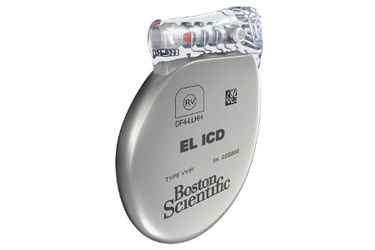Boston Scientific Launches World's Longest-Lasting ICD

The first U.S. patient has been fitted with an Extended Longevity (EL) implantable cardioverter defibrillator (ICD) from Boston Scientific. The new EL ICD line, which includes the Dynagen EL and Inogen EL devices, incorporates the company’s EnduraLife battery technology, which offers nearly 12 years of battery life.
According to a Boston Scientific press release, EnduraLife technology was developed to deliver up to twice the battery capacity of other ICDs on the market. (By comparison, Medtronic’s Evera portfolio of ICDs offers 11 years of battery life.) The EnduraLife technology also enables the EL ICD packaging to be 11 percent smaller and 24 percent thinner than competitive devices.
According to the Mayo Clinic, the lithium batteries traditionally used in ICDs last around seven years, depending on how often the device fires. Six months before an ICD battery reaches the end of its life, a patient usually undergoes a procedure to replace the shock generator. Samir Saba, the surgeon from the University of Pittsburgh Medical Center (UPMC) who implanted the first EL ICD device in a U.S. patient, explains these devices can minimize patient risk and healthcare costs. “Battery longevity has a direct impact on patient outcomes and the cost of care,” Saba said in the press release. “The EL ICD is an important advancement that can help minimize the frequency of avoidable replacement procedures to help reduce costs and the potential for replacement-related complications.”
In a 2013 study published by the European Society of Cardiology, Saba and a team of UPMC collaborators tested longevity of devices from three different manufacturers. In their conclusion, the researchers commented on the risk of ICD replacement. “Cardiac resynchronization therapy-ICD pulse generator replacement is an invasive procedure with the potential risks of infection, bleeding and damage to the implanted leads,” they wrote. “It is an expensive procedure, which along with the cost of a new device, contributes to rising healthcare costs.”
Joe Fitzgerald, executive VP of Boston Scientific, commented in the press release that, “By providing a device with greater battery capacity, physicians are now able to offer patients a longer lasting device and increased peace of mind, while administrators and payers have new options to more effectively manage healthcare costs and minimize unexpected complications.”
Image credit: Boston Scientific
